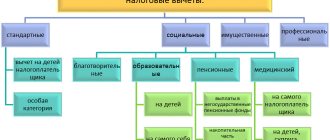The nuances and risks of buying an apartment from a contractor
Along with quite favorable offers for the purchase of new buildings from developers and investors, apartment options from contractors have increasingly begun to appear on the primary real estate market.
Contracting organizations do not specialize in this and, most often, receive construction projects as payment for services provided under offset schemes. Real estate from contractors is 10–15% cheaper than offers from investors and construction companies, which is due to the seller’s desire to receive funds as quickly as possible.
Despite the significant advantage for the buyer, such schemes are associated with certain risks. Let's look at them in more detail:
- Since payments to contractors are made at the construction stage, they do not receive the apartments themselves, but the rights to receive them after the building is put into operation. Thus, contracting organizations, when selling housing rights to citizens, are responsible only for the legality of the documents they submit - they do not provide any guarantees for receiving real estate.
- Since the DDU concluded between the contractor and the developer is subject to mandatory state registration with the Rosreestr authorities, the transfer of rights from the contractor to the buyer also requires such registration (Article 17 of Federal Law No. 214 of December 30, 2004). Without state registration, the assignment of rights is invalid.
- If the contractor goes bankrupt before he fulfills his obligations to the developer, it will be extremely difficult to get his money back.
Example
The contracting organization StroySam LLC entered into an assignment agreement with Petrov, under which it assigned in his favor the rights to an apartment in a building under construction. The rights to the specified real estate arose with StroySam under the agreement concluded with the developer OJSC SU-100, according to which the contractor was obliged to carry out construction work. Subsequently, for regular violations of its obligations, SU-100 unilaterally terminated the agreement with the contractor, which deprived StroySam of the already assigned rights to the apartments, and, consequently, the buyer also lost them. Soon after this, the contractor was declared bankrupt, which prevented Petrov from collecting from him the money already paid for the property.
There are three main agreements on the basis of which the contractor was able to obtain the opportunity to sell the apartment/apartments:
- Participation agreement.
- Investment agreement.
- Contract of sale.
The safest, from the buyer’s point of view, purchase and sale agreement. Within its framework, the developer either directly transfers ownership of the apartment to the contractor, who then sells it to the buyer on a general basis.
Considering the specifics of contractors, often the seller is not even a legal entity, but directly the head of the contractors, as an individual.
However, such a situation is rare; more often than not, the apartment is registered in the name of a contractor and sold by a legal entity.
The worst and riskiest option for the end buyer is an investment agreement. Unlike all the others, it is concluded in advance and comes into force even before all the contractor’s work is completed. As a result, the contractor has an obligation that he must complete all work, otherwise the apartment will have to be returned to the developer.
The trouble is that the contractor acquires ownership of the home in advance and, in order not to waste time, he can immediately look for a buyer for the apartment, since this can take quite a long time.
But if, at the same time, he already sells the apartment, and then does not complete all his work, then it turns out that the investment agreement will be terminated unilaterally due to the failure of the other party to fulfill its obligations. In this case, the contractor “retroactively” loses the right to housing.
As a result, he had no right to sell the property. The developer will require the buyer to move out of the apartment, and it is almost impossible to collect money from the contractor.
Example: The contractor agreed with the developer to draw up an investment agreement, under the terms of which the developer transfers one of the apartments in the new building to the contractor. In return, the contractor performs all interior finishing work, for example, in all apartments of one entrance.
The contractor, having received the apartment, immediately sells it to the buyer and disappears from the horizon, not fulfilling his obligations to the developer.
The investment contract is terminated, the buyer loses his home, and the contractor remains with the money, since he can completely liquidate his company and create a new one, if necessary.
Most often, the scheme described above with an investment agreement is carried out by scammers who initially did not intend to do anything, but just wanted to get money, but there are other options. In any case, if it turns out that the housing was transferred to the contractor under an investment agreement, this is already a bad sign.
There is practically no ideal option for the buyer to protect himself. Confirmation that all work under the investment agreement has been completed can be requested, but this is rarely provided. It is not worth purchasing such housing without the help of an experienced lawyer - the risk of losing it is too great.
In addition to what is described above, risks may arise for other reasons. For example, a contractor is not actually one. Fraudsters also take advantage of this. They provide “fake” documents or do not provide them at all, and as a result, they disappear with money for housing to which they had no right at all. You can protect yourself, at least partially, by checking the contractor:
- Check the existence of the contractor. Typically this information is publicly available.
- Request documents on the basis of which the contractor works with the developer.
- Take a copy of the contract on the basis of which the contractor received housing. It is necessary to check that the contract really exists and is registered according to all the rules, and is not a fake.
- Take an extract from the Unified State Register of Real Estate for the housing being purchased and see who actually owns it, whether there are any encumbrances on the apartment, and so on.
A significant part of all actions involves checking documents and, most importantly, their authenticity. Not every person knows how to do this correctly. Here you will also need the help of an experienced lawyer. Without it, it is better not to conclude such deals at all.
Despite the many different options in which the contractor was able to obtain housing from the developer, the purchase itself is made in the usual way, because in any situation the contractor becomes the owner of the property and therefore has the right to sell it in the same way as any other property owner.
Procedure
- Check all documents, the contractor and, if possible, the developer (sometimes the developer and contractor work as scammers together, but this is rare).
- Prepare documents and money for the transaction (remember that it is almost impossible to obtain a mortgage loan for such housing; the bank also understands the potential risks and is unlikely to agree to such a transaction).
- Draw up and sign a purchase and sale agreement.
Have it notarized and registered. - Transfer the required amount for housing. Receive confirmation of receipt of money (the latter is especially important if payment is made in cash).
- Sign the acceptance certificates.
These documents often eliminate most of the parties' potential claims. - Register ownership of housing in Rosreestr.
We suggest you read: How can an owner remove a person from an apartment without his or her consent?
Required documents
There are a lot of options for obtaining housing, so depending on the situation, the list of documents can vary greatly. And in order to determine what exactly is needed in a particular case, the help of an experienced lawyer is also required.
Such a purchase involves the following expenses:
- Payment for notary services for certification of the purchase and sale agreement: from 2000 rubles and above (depending on the region where the apartment is located).
- State duty for obtaining an extract from the Unified State Register of Real Estate: 350 rubles (often it is ordered by a contractor at his own expense).
- Registration of property rights of the new owner: 2000 rubles per 1 person.
Despite the fact that such housing can be significantly cheaper than buying the same apartment from a developer or from another owner, such an operation is quite risky. At a free consultation, experienced lawyers will help you understand potential problems and ways to solve them. They are also ready to represent the interests of the client, defending his rights when supporting the transaction, and also, if it comes to this, in court.
FREE CONSULTATIONS are available for you! If you want to solve exactly your problem, then:
- describe your situation to a lawyer in an online chat;
- write a question in the form below;
- call Moscow and Moscow region
- call St. Petersburg and region
Buying an apartment from a contractor carries certain risks and has a number of nuances that are directly related to the characteristics of the subject of the transaction - residential premises in a building under construction. The buyer will have to pay special attention to factors that are typical only for shared-equity housing construction.
- in cash;
- ready-made objects - apartments in a built house;
- rights to future housing.
If the contractor is given finished apartments or the right to claim residential premises, he can enter into transactions with these objects on the general grounds provided for by civil law.
The purchase of finished apartments is accompanied by the following features for the buyer:
- the contractor can sell objects for which he has registered his ownership;
- the sale can be carried out without registering rights to the contractor, in which case he will act under a power of attorney from the customer building the house.
The buyer will have to check the contractor’s authority to dispose of the property, after which the transaction is subject to registration in accordance with the general procedure through the Rosreestr authorities.
How to avoid problems and save money
Not all apartments are sold before the building is put into operation; often, after several years from the commissioning of the property, apartments are unsold. In this case, that is, when the living space is registered as a property, you can buy it. The discount, of course, will be lower, but risks are practically eliminated, since a purchase and sale transaction is being completed.
In addition, there are a number of factors that need to be taken into account in the process:
- It is worth checking the reputation of the developer, how intensively the properties are being delivered, whether there are cases of non-delivery, financial situation, etc. You need to check all permits to see if there are any debts.
- The DDU must be registered; only in this case will it be possible to exclude double or triple sales.
- The contractor must have a certificate of full payment for the apartment, copies of the document on offset for the real estate. This will mean that mutual obligations have been fulfilled.
- If the apartment is registered as a property, this is an ideal option.
- You need to request a document about ownership and equity participation in the unified register.
- If the contracting organization is a joint-stock company, it is worth checking whether the person offering the apartment has the authority to take such actions.
Scheme for purchasing an apartment from a contractor
When deciding to purchase an apartment from a contractor, buyers must minimize the risks they face, which is only possible through a thorough approach to searching for offers and systematizing their subsequent actions.
When analyzing proposals from contractors, the more important factor that should influence the choice of housing will not be the “seller” himself, but the reputation of the developer with whom he cooperates, since the final result will depend on him.
The DDU concluded between the developer and the contractor may provide for a prohibition on the transfer of rights or its restriction, requiring the payment of a certain fee to the developer.
To avoid falling for such a “trick”, before purchasing an apartment from a contractor, you must carefully study the initially concluded contract.
So, when purchasing housing through a contractor, it is recommended to adhere to the following scheme:
- Search for an offer. While choosing a suitable offer, you also need to select a developer. It must be remembered that unreasonably low prices may hide fraud or delays in construction.
- Developer check. Having decided on an apartment, you must adhere to standard recommendations for checking the developer - reviews and reputation on the Internet, time on the market, checking its constituent documents, licenses, building permits, etc.
- Visual inspection. If the housing is in the early stages of construction, then the inspection will be limited to checking the development of infrastructure and compliance with the pace of construction and the plan. If the house has already been built, then the apartment should be inspected and checked for compliance with the project and area.
- Signing the contract. After checking all the documentation and the housing itself, to purchase it you need to conclude an agreement with the contractor, the type of which will depend on the readiness of the housing and the form of legal relations. The document must have a direct reference to the agreement concluded between the contractor and the developer, and the transfer of rights to the buyer must undergo state registration. This stage is not recommended to be completed without legal support.
- Reception of the apartment. After completion of construction and commissioning of the house, the developer must transfer the object to the buyer, which, according to Art. 556 of the Civil Code of the Russian Federation (hereinafter referred to as the Civil Code of the Russian Federation), is formalized by a transfer deed. After this, the new owner can register his property rights in Rosreestr.
How to buy - procedure
The transaction is carried out in several stages:
- search for current offers;
- checking the documents of the seller and the developer;
- viewing the facility and infrastructure nearby;
- execution of the contract;
- acceptance of the apartment using the transfer and acceptance certificate;
- registration of property rights in Rosreestr;
- moving and registration in the apartment.
The most important role in the purchase and sale procedure is played by a thorough check of documents.
We provided detailed instructions on purchasing housing in a new building using various methods in a separate article.
Required documents
For citizens who decide to purchase housing in this way, one passport will be enough. For purchases made with mortgage funds, a loan agreement will be required.
The Contractor provides notarized copies of:
- development plan;
- building permits;
- project declaration;
- documents for land, certificates;
- authorizing the sale and originals of constituent documents;
- service agreements;
- document giving the right to sell;
- assignment agreement.
Conclusion of an agreement and registration
The seller draws up a standard contract in advance, in triplicate, after which it is required to register it with Rosreestr. It is usually the buyer who contacts this organization.
To register, you need to write an application and pay a state fee . (For an individual - 2000 rubles, for a legal entity - 22,000 rubles). Registration is carried out within a period of no more than 1 month and after that the agreement comes into force.
How do the parties settle?
The conditions for transferring payment are specified in the contract and are determined by the parties individually. This can be payment in cash at the cash desk, installments, loan agreement, bank transfer, etc.
The deal and its nuances
There are several ways to buy an apartment from a contractor.
There are important differences between them:
- Assignment agreement. In accordance with such a document, the apartment does not become the property of the buyer. The future tenant receives only the rights to receive it. Such a document must contain a reference to the transaction with the developer and all the conditions stipulated by it. An assignment agreement is only possible until construction work is completed and the house is put into operation.
- Assignment of rights. This type of transaction is one of the riskiest, as it contains a whole chain of documents that is almost impossible to track. Its essence lies in the fact that the contractor of a large construction project, in need of help, hires subcontractors, transferring apartments to them as compensation under an assignment agreement. Thus, the buyer is already completing the procedure of purchasing an apartment from the assignment contractor. The main problem is that any of the links in this chain can go bankrupt, and the buyer will be left with nothing.
- Contract of sale. This is the safest option for purchasing an apartment from a contractor, since it can be concluded only after completion of construction work. That is, the apartments are ready, and all the work has been completed by the contractor. However, the cost of this type of housing is much higher.
Nuances
Even if you have checked all the documents, studied information about the contractor, etc., you should not let your guard down throughout the entire home buying process.
These tips will protect you as much as possible from negative consequences:
- Do not be afraid to contact professional lawyers, especially if you are not confident in yourself. It's better to be safe than sorry.
- The surest way to make sure of the reliability of the contractor is to come to the main office of the developer and find out all the necessary information about him first-hand.
- Before the transaction, go to Rosreestr and make sure that there are no restrictions or encumbrances imposed on the residential complex or house in which you want to purchase an apartment. The presence of restrictions will significantly complicate the process of concluding a deal.
- Be sure to obtain a certificate from the developer company confirming full payment of the cost to protect yourself from a possible transfer of debts. This is a common way for buyers to be deceived by dishonest contractors.
- When concluding an agreement with a contractor, make sure that the document contains a clause indicating the developer’s consent to the transfer of square meters.
How do contractors and subcontractors work in construction?
In construction, with rare exceptions, there are no enterprises that independently carry out the full range of work undertaken. Therefore, the concepts of a general contract for construction work and partial or full subcontracting have emerged. To understand how contractors work, it is advisable to study open competitive procedures announced on trading platforms for the construction of objects for various purposes and analyze the documentation offered by Customers. The package of competitive materials often contains special individual parameters that the selected contractor must meet. Often, in order to win a tender or competition, not only experience, the presence of a specified number of completed and delivered objects, but also the possession of specific resources are required. This could be: special construction equipment, human resources, contracts with manufacturers of building materials. To understand how subcontractors work in construction, in the documentation for the site you can look at separate lists of work, which, as a rule, are not related in execution and timing to other sets of work that can be transferred to other contractors. Often the general contractor selects subcontractors through competitive procedures. In this case, you can familiarize yourself with the documentation and basic parameters specifically for subcontracted work.
How to buy an apartment from a contractor? Features and rules of the transaction
The specificity of the legal relationship between the buyer and the contractor is that if the transaction is concluded at the construction stage, the organization transfers to the future owner not the housing itself, but the rights to receive it. This determines some features when completing a transaction.
We suggest you read: How heirs under a deed of gift can pay bills for an apartment
Regardless of what contract is used to formalize the purchase of an apartment from a contractor, if the housing has not yet been completed, the assignment of rights under it is subject to mandatory
state registration
(
Art. 17
Federal Law No. 214).
According to paragraphs. 30 clause 1 art. 333.33 of the Tax Code of the Russian Federation, the state duty for state registration of the assignment of rights of claim under the DDU is 350 rubles.
Let's consider the most common options for processing transactions for the purchase of housing with contractors:
- Assignment agreement. An agreement for the assignment of rights of claim (Article 388 of the Civil Code of the Russian Federation) in favor of the buyer will be valid if the main agreement (for example, DDU) does not prohibit such an assignment. It is drawn up in writing and must contain an indication of the deal initially concluded with the developer and the conditions determined under it. The assignment agreement can be signed only before the house is put into operation - after that, the housing can be sold only by purchase and sale.
- Agreement on assignment of rights. During large-scale construction, general contractors involve smaller organizations - subcontractors, with whom payments are also made by apartments, under an assignment agreement. They, in turn, assign the rights to real estate assigned to them to citizens for a fee. The risk of concluding such an agreement lies in a possible “chain” of such assignments, the fulfillment of obligations under which cannot be traced.
- Co-investment agreement. According to Art. 4 Federal Law No. 39 of February 25, 1999, contractors, under an agreement concluded with the developer, can simultaneously act as investors, providing their services as investments, in return for which they receive rights to apartments. In this case, for their sale, co-investment agreements are concluded, under which the rights to housing are transferred to citizens to the extent that they belonged to the contractor-investor.
- Contract of sale. The safest option is to purchase an apartment from a contractor. Concluding such a transaction is permissible only after the house has been put into operation and the contractor has registered ownership of the housing, which naturally significantly inflates its price.
List of documents
To sign a contract with a contractor for the purchase of an apartment in a new building, citizens will need to provide a minimum package of documents.
The main document required to complete the transaction is a passport.
If you are married, it is advisable to have a notarized
spouse's consent
(
clause 3 art. 35
Family Code of the Russian Federation) and marriage certificate.
No other documents are needed directly to conclude the contract. However, subsequent registration of the transfer of rights to the buyer, in addition to the documents already specified, will require the provision of:
- Applications for state registration.
- Receipts for payment of state fees.
- Initially a contract concluded between the developer and the contractor.
- Assignment agreement between the contractor and the buyer.
- Certificates of fulfillment of all obligations of the contractor or agreement on transfer of debt to the buyer.
- The developer’s written consent to the transfer of rights (if provided for in the original agreement) or notification of such a transfer.
A profitable investment is the purchase of real estate in a house under construction. The greatest savings are possible when purchasing at the initial stage of construction.
The sale of apartments is carried out by developers, investors and contractors. By buying housing from the latter, you can save 10% or more of the cost. In this article we will look at the advantages and possible risks of purchasing housing from contractors.
Dear readers! Our articles talk about typical ways to resolve legal issues, but each case is unique.
If you want to find out how to solve your particular problem, please use the online consultant form on the right or call. It's fast and free!
Show content
A contractor is a company working under a contract. This company carries out the customer’s instructions during the construction of the house, and as payment for its services receives apartments in the house under construction from the developer. The parties enter into an agreement for shared participation in construction, or certain apartments without an agreement are reserved for the contractor.
The resulting apartments are most often sold in advance in order to be able to pay workers, purchase materials, etc. If there is no such need, the sale of real estate is carried out already at the stage of handing over the house.
In terms of its legal status, the contractor differs from the developer, therefore he cannot re-register a shared construction agreement for the buyer; the assignment of property rights (Article 388 of the Civil Code of the Russian Federation) or the execution of a purchase and sale agreement (Articles 549-558 of the Civil Code of the Russian Federation) are within his competence.
The assignment of rights to claim an apartment is a procedure regulated by law.
The advantages of buying an apartment through a contractor are not many, but they are quite significant. Since the contractor is a company engaged in construction work, it sets the minimum price for the sale of apartments. Typically, you can save 5-10 percent.
If the contractor’s financial situation is difficult, and the developer pays for the work exclusively in apartments, the savings on the purchase will be even greater, since the contractor needs to sell the property as quickly as possible.
To solve your problem RIGHT NOW get
Show content
What's the point?
Contractor is a company that works under a contract, for example, engaged in glazing, landscaping, finishing, or construction and installation work. In other words, this is the executor of the customer’s instructions, who was hired for the construction period.
The contractor receives apartments in a house under construction or commissioned from the developer as payment for his services performed, that is, through barter. To do this, an agreement on shared participation in construction (DDU) is concluded between the parties, or apartments are simply reserved for the contractor (without drawing up an agreement).
Features of purchasing housing from a contracting company:
- The contractor enters into an equity participation agreement (EPA) with the developer or agrees to book apartments in exchange for services provided.
- The transfer of rights to individual buyers occurs as a result of the assignment of rights or the conclusion of a DDU agreement with the developer.
- The transfer of rights under an agreement or the conclusion of a DDU agreement is subject to state registration.
Rights to apartments are acquired at the initial and final stages of construction, when mutual settlements take place between the contractor and the developer. The peculiarity of the assignment is that as a result of such a transaction, the validity of the DDU does not terminate. The party simply changes (instead of the contractor, the buyer becomes the buyer). The rights of the contracting organization are transferred to the new participant, but all the terms of the main agreement remain the same.
We invite you to read: Subsidy for pensioners for rent
An assignment agreement with an individual buyer is not much different from a regular transaction of assignment of rights from one investor to another, which occurs all the time in the market.
But there is one very important feature: if the construction is not completed, that is, if the contractor’s obligations are not fulfilled, then the rights to the apartments can be revoked at any time, since the DDU agreement can be terminated.
Important: the agreement with the contractor should not be confused with the DDU and the assignment agreement with the buyer (individual investor). If a realtor says that it is “practically the same” and the buyer will not have any risks, then you should not trust him to complete the transaction.
The benefits of buying a home from a contractor can be quite significant:
- Apartments at the zero stage (if you chose them at this stage) are much cheaper than at the end of construction.
- The contractor himself can give a discount if he urgently needs funds. By the way, he himself can also get future square meters at a completely different price than an ordinary buyer on the street. Prices may be lower for contractors.
If the contracting organization is completely financially stable, has been working in the market for many years and has no intention of leaving the market, then there is nothing wrong with buying housing from it. On the contrary, it can be a very successful deal.
But there are other situations. The contractor can sue the developer or be in a state of conflict and during this period “throw away” the apartments transferred to him to the buyers. Trusting investors may not be aware of the risks involved.
The result of such gullibility: the rights to the apartment are disputed by the developer. One day, buyers may receive a court decision that the DDU agreement is terminated due to the fact that the contractor violated its obligations and, accordingly, the assignment of rights to another person is invalidated. In this case, the buyer has the right to demand his money from the contractor. Judicially. How long this process will take depends on the solvency of the contracting company.
- Let us add that this risk is an unnecessary addition to the existing ones, because the house may not be completed due to lack of funds, the developer may disappear with the money, or the construction may be mothballed for a long period of time.
- Advantages: low price for apartments.
- Disadvantages: high risk of losing rights to housing under construction.
If you need to receive an extract from the Unified State Register in a short time, take advantage of the special offer from our partners below.
Attention! The main risk of purchasing housing from a contractor is that the organization may be declared bankrupt before the completion of construction and commissioning of the house.
This means that the company will not have time to fulfill its obligations to the customer, and, therefore, he may demand the return of the rights to the transferred square meters.
Nuances
Ways to buy housing in a new building
An apartment can be purchased in several ways, based on the initial title document received by the seller, which allows participation in the property transaction. Among them:
- Agreement of assignment or assignment. It can be used at the initial stages of construction if the seller has received from the developer the right to claim the apartment, which he can transfer to the assignor. Such a transaction has the lowest level of legal protection.
- An assignment agreement, if a DDU is concluded between the customer and the contractor in the name of the seller (read about what a DDU is when buying an apartment and what are the features of transactions with shared participation here).
- An agreement on the assignment of rights in the second and third generation, if the contractor has sub-hired a subcontractor, transferring to him the right of claim. In this case, the main thing is to obtain all copies of the assignment agreements so that the chain of succession is not broken.
- A co-investment agreement can be drawn up if initially the relationship between the contractor’s services was formalized as an investment in construction. Such an agreement is tripartite in nature and is concluded between the parties to the transaction and the developer.
- The purchase and sale agreement is drawn up after the facility is put into operation according to standard schemes for conducting a property transaction. Allows for the registration of a mortgage, offset of existing housing, and the use of funds from certificates.
The most common is the assignment agreement, which allows the transaction to be completed at the initial stage.
Reference. When drawing up an assignment agreement, you should check that the title document does not indicate a prohibition on assignment.
But the preferable option would be to purchase an apartment registered as the property by a contractor, since it is practically devoid of any risks and is as safe as possible. In addition, it is possible to take out a mortgage loan here, and the quality of the apartment can be verified after the fact.
We talked about what you need to know so that buying an apartment in a new building does not turn into troubles in our article.
Registration procedure and required documents
Registration of real estate purchased from a contractor is subject to mandatory registration, as with any other purchase.
You don't need a law degree to protect yourself.
It is necessary to follow several rules, and then the risk of becoming homeless will be close to zero:
- The secret to a successful transaction is a successful contractor, as mentioned above. First of all, check all the information about him: any complaints, facts of participation in legal proceedings regarding the quality of the work he performs, financial statements. Find out why the apartments are for sale and why the price has been reduced. In short, find out if he can complete the job. If everything is in order, go to the second point.
- Before purchasing, be sure to obtain copies of documents from the contractor confirming its official registration. In addition, the DDU must be noted in Rosreestr (otherwise it is considered invalid).
- You must also take a copy of the contract if the work has not yet been completed. This way, the buyer will see what part of the work has already been completed and what still needs to be done. This way you can more accurately assess the risk of your purchase.
- Be sure to take a document confirming full payment of the cost of the apartment (if any) and a certificate of payment for work per square meters of housing.
An honest contractor will not mind providing this information, since he has nothing to hide. If problems arise with obtaining documents, it is better to postpone purchasing housing and find another contractor.
Buying an apartment from subcontractors
General contractors and other large contracting structures may involve smaller organizations to perform some tasks, which act as subcontractors in the process of building a house. Payments to them for services provided are also often carried out through the assignment of rights to an apartment under assignment agreements. To earn money for their work, subcontractors sell the objects transferred to them by assigning rights to them.
In fact, the scheme for purchasing apartments from such organizations is practically no different from purchasing housing from the main contractors and is formalized in similar agreements.
However, the “chain” of assignments between subcontractors can be multiple, which makes it impossible to verify the fulfillment of the obligations of each of them, for which the rights to the apartment were assigned. The risk of such schemes is that if at least one organization from the “chain” fails to fulfill its obligations, the last buyer will be deprived of housing.
What is the assignment of rights to new housing?
Real estate in a high-rise building under construction can be purchased not only in the standard way through the conclusion of a DPA (share participation agreement), but also through the so-called. assignment - assignment of rights of claim (PPT). Since at the time of concluding such a transaction the apartment does not yet legally exist, we are talking about the transfer of ownership rights to an object that will appear in the future. Thus, the buyer accepts not only the rights of the shareholder, who acts as the seller, but also his obligations. This and much more gives rise to certain risks, however, assignment is often the best way to purchase housing.










